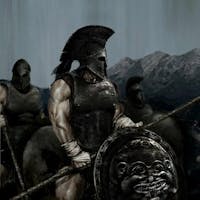Did the Ancient Greeks leave a big Genetic impact on Anatolia?
 Arberian 10/05/2024
Arberian 10/05/2024 
For what we have Genetically from Iron Age and Roman Anatolia we see that there's is little Greek influence among them, if we check them on a PCA we see that they have little to do with the Ancient Greeks and stick with native Anatolians from the Bronze Age.

In the time of those Bronze Age Anatolian samples the Proto-Greeks weren't even present in today's Greece, and we also see other Anatolian samples from different timelines to completely be the same with Bronze Age native Anatolians.
Roman era Anatolians did have some Genetic influence from the Mycenaeans and the Levant which is true, but not at a "large" extent. Even if they were 30% Ancient Greeks, they won't be ancient Greek.
Here's their admixture:

Here are the only Anatolian samples with Ancient Greek influence among them:

The only confirmed Roman-era Greek sample indicates a significant Anatolian shift, suggesting that the DNA of ancient Greeks during this period was nearly extinct. This sample shows very low levels of ancient Greek autosomal DNA and contains a considerable amount of non-European base components when compared to the Mycenaeans and ancient Greeks from Iron Age Delphi.



The claim Albanians have Thracian autosomal is only based on some G25 or qpAdm models that don't pass, or E-V13 that could be of Thracian origin. However, there is not a single Albanian clade that can be definitively linked to any Iron Age Thracian lineage, making it difficult to substantiate claims about its' origins.
Albanians for surely score higher P-Value with Illyrians instead of Thracians on qpAdm if a 1-Way model was done, no matter what right pops will be usen.
The best theory of the origins of E-V13 among Albanians is that it's inherited from the Dardanians. For example the Himera mercenaries with E-V13 are Dardanians, that explains it all.



About Arberian
An Albanian, interested in history and genetics.